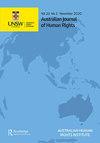The impact of public interest litigation: the case of socio-economic rights
Q1 Arts and Humanities
引用次数: 0
Abstract
ABSTRACT In the global turn to rights, courts are often reified as central actors in processes of social transformation. In this respect, it is worth recalling the clear-eyed and grounded perspective of Andrea Durbach, who emphasised both the potency and limitation of litigation, as well as the diverse functions of courts. This Festschrift essay assesses the transformative power of socio-economic rights litigation. It begins by setting out the different reasons as to why we would expect (or not) judicial intervention on socio-economic rights to engender social change and then distils some central methodological parameters for assessing and undertaking empirical research. This is followed by an overview of the literature with case studies on housing rights litigation in South Africa and education rights in the United States. This reveals significant variance in material and political outcomes for applicant individuals, communities and social movements but points to key determinants of ‘success’—especially the role of social mobilisation, creation of broad-based alliances, and smart remedies.公益诉讼的影响:以社会经济权利为例
在全球权利转向中,法院往往被具体化为社会转型过程中的核心行动者。在这方面,值得回顾安德烈·德巴赫(Andrea Durbach)清晰而扎实的观点,他强调诉讼的效力和局限性,以及法院的多种功能。本文评估了社会经济权利诉讼的变革力量。它首先列出了我们为什么期望(或不期望)司法干预社会经济权利以产生社会变革的不同原因,然后提炼出一些用于评估和开展实证研究的核心方法参数。接下来是对南非住房权诉讼和美国教育权案例研究的文献概述。这揭示了申请人个人、社区和社会运动在物质和政治结果上的显著差异,但指出了“成功”的关键决定因素——特别是社会动员的作用、建立广泛的联盟和明智的补救措施。
本文章由计算机程序翻译,如有差异,请以英文原文为准。
求助全文
约1分钟内获得全文
求助全文
来源期刊

Australian Journal of Human Rights
Arts and Humanities-History
CiteScore
1.30
自引率
0.00%
发文量
43
期刊介绍:
The Australian Journal of Human Rights (AJHR) is Australia’s first peer reviewed journal devoted exclusively to human rights development in Australia, the Asia-Pacific region and internationally. The journal aims to raise awareness of human rights issues in Australia and the Asia-Pacific region by providing a forum for scholarship and discussion. The AJHR examines legal aspects of human rights, along with associated philosophical, historical, economic and political considerations, across a range of issues, including aboriginal ownership of land, racial discrimination and vilification, human rights in the criminal justice system, children’s rights, homelessness, immigration, asylum and detention, corporate accountability, disability standards and free speech.
 求助内容:
求助内容: 应助结果提醒方式:
应助结果提醒方式:


